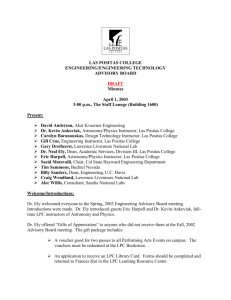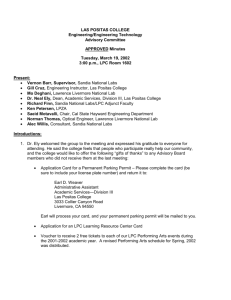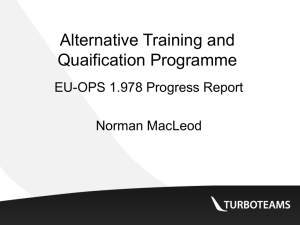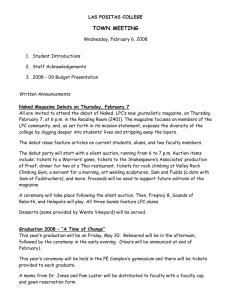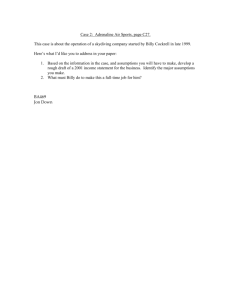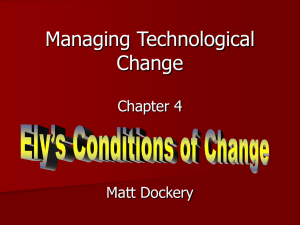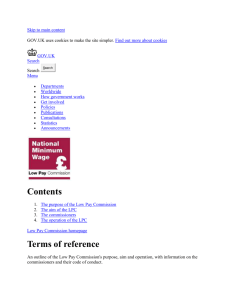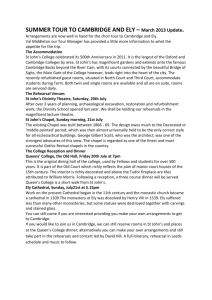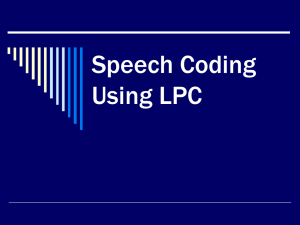October 29, 2002 - Las Positas College
advertisement
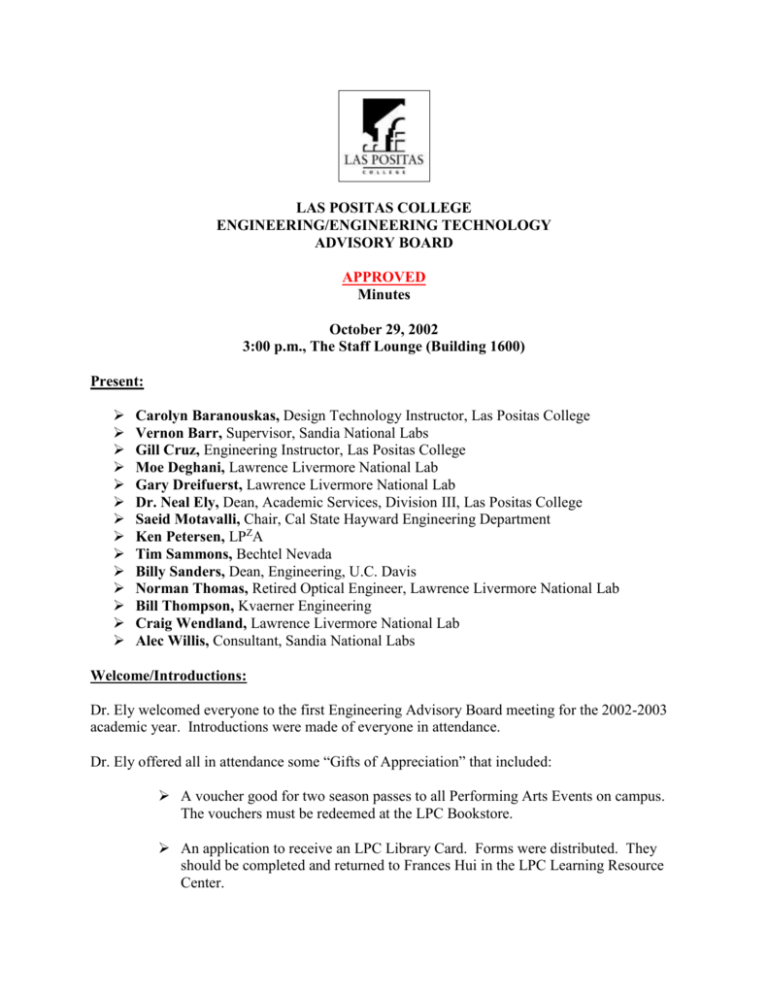
LAS POSITAS COLLEGE ENGINEERING/ENGINEERING TECHNOLOGY ADVISORY BOARD APPROVED Minutes October 29, 2002 3:00 p.m., The Staff Lounge (Building 1600) Present: Carolyn Baranouskas, Design Technology Instructor, Las Positas College Vernon Barr, Supervisor, Sandia National Labs Gill Cruz, Engineering Instructor, Las Positas College Moe Deghani, Lawrence Livermore National Lab Gary Dreifuerst, Lawrence Livermore National Lab Dr. Neal Ely, Dean, Academic Services, Division III, Las Positas College Saeid Motavalli, Chair, Cal State Hayward Engineering Department Ken Petersen, LPZA Tim Sammons, Bechtel Nevada Billy Sanders, Dean, Engineering, U.C. Davis Norman Thomas, Retired Optical Engineer, Lawrence Livermore National Lab Bill Thompson, Kvaerner Engineering Craig Wendland, Lawrence Livermore National Lab Alec Willis, Consultant, Sandia National Labs Welcome/Introductions: Dr. Ely welcomed everyone to the first Engineering Advisory Board meeting for the 2002-2003 academic year. Introductions were made of everyone in attendance. Dr. Ely offered all in attendance some “Gifts of Appreciation” that included: A voucher good for two season passes to all Performing Arts Events on campus. The vouchers must be redeemed at the LPC Bookstore. An application to receive an LPC Library Card. Forms were distributed. They should be completed and returned to Frances Hui in the LPC Learning Resource Center. Engineering Advisory Board Meeting Minutes October 29, 2002 – Page 2 The college is offering a new parking pass to Advisory Board members that are good through 2005. Vehicle registration information is required, and Board members should see Earl Weaver, Administrative Assistant to Dr. Ely, after the meeting in order to get their parking passes. Approval of Spring, 2002 Minutes: Alec Willis moved to accept the minutes from the March 19, 2002 meeting. Saeid Motavalli seconded. The motion was passed unanimously. College Update of Programs: Fall, 2002: Dr. Ely reported enrollments are strong, especially in the Engineering 10 course. A second section of Engineering 10 was added and is being offered during the evening. Gill Cruz said his intention for offering the class during the evening was to attract high school students, but all who enrolled this semester have dropped. He said he’s been in contact with the high school counselors, and they reported most of the students didn’t want to do all the written work required in the class. Enrollments for Fall, 2002 are: Course Engr 10-093 Engr 10-V01 Engr 15-093 Engr 20-V01 Engr 35-093 Title Introduction to Engineering Introduction to Engineering Intro to Optical Science/Engineering Engineering Graphics Statics Allowed 30 30 30 30 30 Enrolled 24 22 6 18 10 Instructor Cruz Cruz Bayramian Cruz Cruz Gill reported he has had a lot of guest speakers come to his classes, and the students really are enjoying the information they are getting from professionals in the industry. Alec Willis asked if Gill has students working on a project in the Introduction class? Gill said he has looked at the possibility, but he focuses more on the introduction to careers of Engineering, especially since most of his students in that class are not math and science ready to take on projects. He said he also would need one more unit added to the course for a lab in order to accommodate the work on projects. Billy Sanders said the introduction classes at U.C. Davis don’t do projects either. Most of the work is seminaroriented with plenty of guest speakers. Engineering Advisory Board Meeting Minutes October 29, 2002 – Page 3 Gill said he does do problem-solving exercises with his students, but they don’t really have the time available to handle full-blown projects. Dr. Ely said he was at an Engineering Liaison Conference a couple of years ago and one topic discussed was projects that are not math focused, and it seemed that a number of the community college represented were including these types of projects in their introductory courses. It might be a resource for Gill to use. Alec said Oregon State is doing a program called Tekbots. Tektronics provided seed funding to launch the program. Engineering design and build their first robot in their freshman year, followed by more sophisticated robots in their sophomore, junior and senior years. The students apply what they are learning in the classroom to their robot designs.. The students are so enthusiastic, it really peaks their interest in pursuing further in their Engineering studies. Of course, the problem is locating funding to run such a program, but it might be a good idea to explore. Billy said that at Merced College a similar 3-unit course is taught during summer session, and students work on five projects. Spring, 2003: The following courses will be offered during the Spring, 2003 semester: ENGR 20 ENGR 21 ENGR 44 ENGR 45 Engineering Graphics Descriptive Geometry Introduction to Circuit Analysis Materials of Engineering 2.0 Units 3.0 Units 4.0 Units 3.0 Units Dr. Ely said Randall Duran will be teaching Engineering 20 (Engineering Graphics) again for us next semester. He taught for LPC last Spring. Gill will be teaching the remainder of the Engineering courses. Gill explained the Engineering Graphics course is not designed as a class to teach students how to use CAD, but instead to use it as a tool to be used in the class. It focuses more on philosophy of design and drawing through sketching. It includes more design philosophy and practical application and has a higher level of math proficiency required than a basic CAD class. A textbook on CAD is utilized in the class, however. Craig Wendland said the class is really good. He sees a lot of employees who don’t know basic drafting and design. Their level of expertise is very basic to enhance what they are doing with CAD and Pro/E. Alec asked if students do any company visits in the Circuit Analysis course? Gill said it is hard because many students in the class are not U.S. citizens, so they can’t get cleared to visit the labs. He tries to have guest speakers come to the class and lecture, and bring items with them. Gill is finding that liability issues arise when site visits are involved. Engineering Advisory Board Meeting Minutes October 29, 2002 – Page 4 November Bond Issue: Dr. Ely explained that in the upcoming election, there is a bond on the ballot (Proposition 47). If it passes, LPC will get new gym and physical education facilities, which are badly needed on campus. LPC has approximately 150 acres of land, and we are only using about half of it right now. Dr. Ely said we have reached the 8,500 enrollment mark, and we are looking at possibly having 14,000-15,000 students on campus by the end of the decade, so it is becoming increasingly more important we find a way to complete our building plan. He also noted that the bond would fund plans and working drawings for the next building in line, the multi-discipline classroom building. New LPC Organizational Chart: Dr. Ely reviewed the new LPC Organizational Chart. This is the first time we have had a complete campus organizational chart that shows administration, faculty, and staff. Strategic Planning Brochure: Dr. Ely reviewed the new “Strategic Planning” brochure. He explained the process that has taken place in preparation of our Strategic Plan and how that was summarized in to the new brochure to facilitate sharing the information with the community. New LPC Catalog: Dr. Ely reviewed the new LPC catalog for 2002-2004. Copies were given to each Board member. The program information for Engineering is on page 113. Spring Schedule of Classes: The new schedule of classes for Spring was distributed. Internships: The Tri-Valley Connections Internships Program (TVCIP) helps students prepare for and find internship positions. TVCIP serves junior and senior high school students in the Dublin, Livermore Valley, and Pleasanton school districts, LPC students, and Tri-Valley businesses. Students go through two phases of the program: Internship-Readiness Course at LPC. This course is offered via concurrent enrollment, per the policies of each high school. This one-unit course totals approximately 12 hours of classroom instruction and helps students develop the skills necessary to succeed in the work-world. Topics such as career assessment, resume writing, interviewing skills, and professionalism will be addressed. Engineering Advisory Board Meeting Minutes October 29, 2002 – Page 5 The Internship Experience – After completing the Internship-Readiness course, students are eligible to apply for internships. Employers select applicants and hold interview for internship positions. After the interviews, employers make internship offers to selected students. In addition to their obligations at the work-site, students hired as interns enroll in an Internship Seminar/Field Placement course at LPC. The instructor of this course supervises the internship. Each month, students meet with their Internship Seminar class to discuss and analyze their experiences. Reports to the Board: Student Matriculation: Gill distributed the following table, which demonstrates where LPC students are transferring: Name of School Cal Poly San Luis Obispo Cal Poly Pomona University of California, Davis University of California, Berkeley University of the Pacific University of California, Santa Barbara San Jose State University California State University, Sacramento California State University, Hayward University of New South Wales California State University, Chico 2001 2002 3 4 4 4 2 6 3 1 1 1 1 1 1 Outreach Efforts: Gill reported he is still going to all the local high schools and has been invited back to all of them, except Dublin High School, which has been experiencing a large turnover in administration. Gill was invited to be a member of the Engineering and Science Academy Advisory Board at Amador High School and is also a member of the Engineering Liaison Council. As well, he is working with IMPAC, which works to tie-in community college programs with those at state universities. That program is state-funded for five years. Gill has been to all the local college fairs, and he attended one last week at Granada High School. Engineering Advisory Board Meeting Minutes October 29, 2002 – Page 6 LPC has received a commitment letter from Lawrence Livermore National Labs that they will offer a paid, 10-week summer internship award to an LPC student this year. Gill said he had three students working with LLNL last year, and they have been invited back. This new award will be presented at the Spring Scholarship Awards Ceremony held on campus. Dr. Ely said this will be a very prestigious award for one of our Engineering students and will provide good publicity for our Engineering program. Gill reported he is having the Engineering Program brochure updated. He will be adding “Optical/Science Engineering” to the list of programs as well as four testimonials from former LPC graduates. He will update the some of the course numbers for Physics and Math classes, as they have been renumbered. Alec asked if Gill ever had a booth at the “Expanding Your Horizons” event. Gill said he has not participated in that event but will look into it. Dr. Ely said he has a hard time finding people who will support that program. Discussion Items: Ken Peterson asked if Design Technology students ever go into Engineering? Is there a way that program could be integrated with the Engineering program? Carolyn Baranouskas said the programs do share some students because they realize they need more studying to become better Engineers. Dr. Ely said this topic was discussed at the Design Technology Advisory Board as well. The problem is the Design Technology program is not transfer-focused, whereas the Engineering program is solely focused on transfer requirements. Many students find it is hard enough to complete the required Engineering courses, and they don’t have time to take any extra Design Technology courses. Carolyn said she has had some Engineering students take her Design Technology courses in order to get hired somewhere and work while they finish their Engineering requirements. Dr. Ely said many students don’t cross over from Design Technology, because the math requirements in the Engineering program are much more stringent. Craig asked if Design Technology students could take Introduction to Engineering in place of something else required of them? Dr. Ely said the Design Technology students do have elective classes they must complete, so they could take Introduction to Engineering as an elective. Saeid Motavalli suggested cross-listing Engineering 20 with Design Technology 62A. Gill said that would not work because Design Technology 62A is only a tool manipulation class and doesn’t address Engineering design. Engineering Advisory Board Meeting Minutes October 29, 2002 – Page 7 Recommendations by the Advisory Board: Alec Willis recommended recruiting new members to the Engineering Advisory Board to broaden the representation of industry professionals. Ken Peterson seconded. The recommendation was passed unanimously. Ken said Applied Bio Sciences is moving into Pleasanton and would be a great resource to contact. Alec asked how the Advisory Board could add more value to the LPC program, either collectively or individually? Dr. Ely said getting partners to assist with finances and equipment for our labs would be extremely helpful, especially in light of the recent cuts in the State budget. It is always a plus for LPC when equipment is donated, because it gets used by students in engineering and physics classes, so it ends up serving a double purpose. Gill said he had two textbooks he would like to use in his classes, but each book costs more than $100 each. He doesn’t want to burden his students financially by requiring them to purchase both books. He would like to get seven copies of the second textbook to have at the reference desk in the school’s Learning Resource Center. It would be extremely beneficial to the program if a company or individual were interested in purchasing those textbooks as a donation to the program. Alec asked if the school has a Foundation? Dr. Ely explained the college is in the process of forming a Foundation. It is a high priority of our new President, Karen Halliday. Alec said that having a Foundation helps people donate to specific programs and it provides a tax deduction. Norm Thomas recommended LPC establish an optical fabrication lab on campus. Tim Sammons seconded. The motion passed. There were two negative votes from Saeid Motavalli, CSU Hayward, and Billy Sanders, UC Davis. There was one abstention from Alec Willis. Norm said it would greatly benefit our students to teach them how to fabricate optical lenses. He taught a course on optical fabrication for Yuba College, but the program was cancelled, and they donated all their equipment to U.C. Davis. Billy said that if U.C. Davis was the recipient, it must have gone to the Applied Science program, because his Engineering programs did not receive an equipment donation from Yuba College. Billy said he would review the curriculum in his Optical Engineering program to see if and how a class could be articulated with LPC. Gill suggested instead of creating a separate course, it could be taught as part of laboratory exercises for Engineering 15. That would give his students a good hands-on experience in the lab. Bill said that would work, because it would match part of the lab experience with Engineering 1 at U.C. Davis. Engineering Advisory Board Meeting Minutes October 29, 2002 – Page 8 Dr. Ely said that training our students in optical fabrication would fit better with a vocational track of classes rather than part of a transfer program. Carolyn said she could see it being offered within the Design Technology program, which is geared to a 2-year sequence of courses. Billy Sanders recommended the college undertake a study of colleges accepting transfer students and look at their admissions requirements to insure articulation agreements are current. Saeid Motavalli seconded. The vote was unanimous to accept the recommendation. Billy expressed some concerns that math and programming requirements in the Engineering program at LPC are not matching articulated requirements with U.C. Davis, specifically in terms of linear algebra and separate instruction in MatLab. Saeid Motavalli recommended a separate course be developed to teach MatLab and it be added to the LPC curriculum for Engineering students. Billy Sanders seconded. The vote was unanimous to accept the recommendation. Moe Deghani asked if any follow-up work has been done on last semester’s recommendation to track students who transfer from LPC. Billy said U.C. Davis completed a study last year comparing transfer students to “native” students who enter U.C. Davis as freshmen. The report found the following: Native students usually complete the program in four years and two quarters, whereas transfer students finish in two years and two quarters. Native students usually completed 16 units a quarter, whereas transfer students only completed 12 hours a quarter and worked 10 hours a week. In the freshman and sophomore years, Native students showed a higher grade point average. In the junior and senior years, both groups showed similar grade point averages. An average of 2.7 was common in the first two years of school, and an average of 2.8 was common in the second two years. The U.C. Davis program is working on getting all of its students in the junior and senior years to complete their studies within the 2.7-2.85 range. Billy said he has found that transfer students who make it into the U.C. Davis program are every bit as good as those who entered as freshmen, and transfers seem to do extremely well in the program. Billy said students transferring from LPC must have a 3.1 grade point average in all their technical courses, or a 3.3 if they are missing one required courses and a 3.5 if they are missing two required courses. Engineering Advisory Board Meeting Minutes October 29, 2002 – Page 9 Other: Billy announced that U.C. Davis is in the process of structuring a Computational Engineering major to be offered in the Applied Science division. Curriculum is being prepared and reviewed. Date of the next meeting: Tuesday, March 25 at 3 p.m. The meeting adjourned at 4:40 p.m. Minutes submitted by Earl D. Weaver, Administrative Assistant to Dr. Neal Ely POSTED TO THE DIVISION III WEBSITE ON APRIL 2, 2003
